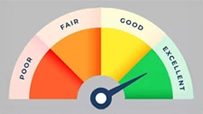How to Avoid Common Home Loan Application Mistakes
September 01, 2025

Buying a home is a significant milestone. However, navigating the home loan application process can be complex and overwhelming, if you're not well-informed. This may lead to common mistakes that could hinder your loan approval.
This article explores the common home loan application mistakes borrowers make when applying for a home loan. We have provided practical loan application tipson avoiding them. Understanding these mistakes and taking the necessary precautions can enhance your chances of a successful home loan application.
Mistake 1: Not Researching Before Applying
Before applying for a home loan, thorough research is essential. Many aspiring home loan applicant skip this step and rely solely on information provided by the builder or seller. Instead, talk to people living in the area to uncover hidden issues.
Also, verify the property's legal documents to ensure everything is in order. Additionally, compare lenders based on interest rates, repayment options, and other factors to find the best fit for your needs.
Mistake 2: Misjudging Your Loan Repayment Capacity
Applicants often overestimate their loan repayment capacity. Factors like income, savings, and expenses influence your eligibility. Not focusing on your repayment capacity before applying may lead to financial stress. Carefully assess your finances to ensure you can comfortably manage EMIs and unexpected expenses without jeopardising your financial stability. You can use our Home Loan EMI Calculator to compare EMIs. This help help you make informed decisions while applying for a loan.
Mistake 3: Insufficient Margin Money
You usually get loans up to 70% to 80% of the property amount. The rest of the money is paid out of your pocket. This amount is known as margin money. Relying entirely on a home loan without contributing sufficient margin money is a common error. Paying more as down payment results in lower EMIs and interest rates.
Mistake 4: Funding Margin Money with Loans
Funding margin money with additional loans increases financial liabilities. Instead, plan early by saving regularly or investing in a Fixed Deposit . This way, you can use your savings and avoid the high-interest costs associated with personal loans. For example, if you need ₹5 lakh for margin money, save five years in advance instead of taking out another loan.
Mistake 5: Neglecting Insurance Coverage
Ignoring insurance while applying for a home loan can be risky. Life, health, and home insurance can safeguard you and your family against unforeseen events. A life insurance policy can protect your family from loan burdens in your absence, while a health insurance policy covers medical costs. Home insurance adds an extra layer of security by protecting your property.
Mistake 6: Ignoring Additional Costs
Ignoring additional costs such as processing fees, registration charges, and other legal expenses can lead to financial strain later. It's crucial to account for these costs when planning your budget to avoid surprises after taking out the loan. Always consider the total cost of the loan, not just the principal and interest.
Mistake 7: Not Checking Your Credit Score
Banks will check your credit score before approving your loan. A higher credit score increases the chances of loan approval. Banks might offer preferential interest rates if you have an excellent credit score, preferably above 750. Similarly, a lower credit score can lead to loan rejection.
Mistake 8: Not Reading the Terms and Conditions
Not reading the fine print thoroughly may have long-term implications. There could be additional charges associated with your loan, balance transfer and loan foreclosure terms and conditions, etc. Read the fine print carefully to avoid any hiccups.
Final Thoughts
By avoiding these common mistakes, you can increase your chances of successful approval. Remember to thoroughly research before applying, accurately assess your loan capacity, bring in sufficient margin money, avoid funding margin money with loans, and prioritise adequate insurance coverage.
Disclaimer:
The contents herein are only for informational purposes and generic in nature. The content does not amount to an offer, invitation or solicitation of any kind to buy or sell, and are not intended to create any legal rights or obligations. This information is subject to updation, completion, amendment and verification without notice. The contents herein are also subject to other product-specific terms and conditions, as well as any applicable third-party terms and conditions, for which Ujjivan Small Finance Bank assumes no responsibility or liability.
Nothing contained herein is intended to constitute financial, investment, legal, tax, or any other professional advice or opinion. Please obtain professional advice before making investment or any other decisions. Any investment decisions that may be made by the you shall be at your own sole discretion, independent analysis and evaluation of the risks involved. The use of any information set out in this document is entirely at the user’s own risk. Ujjivan Small Finance Bank Limited makes no representation or warranty, express or implied, as to the accuracy and completeness for any information herein. The Bank disclaims any and all liability for any loss or damage (direct, indirect, consequential, or otherwise) incurred by you due to use of or due to investment, product application decisions made by you on the basis of the contents herein. While the information is prepared in good faith from sources deemed reliable (including public sources), the Bank disclaims any liability with respect to accuracy of information or any error or omission or any loss or damage incurred by anyone in reliance on the contents herein, in any manner whatsoever.
To know more about Ujjivan Small Finance Bank Products Visit:"https://www.ujjivansfb.in"
All intellectual property rights, including copyrights, trademarks, and other proprietary rights, pertaining to the content and materials displayed herein, belong
to Ujjivan Small Finance Bank Limited or its licensors. Unauthorised use or misuse of any intellectual property, or other content displayed herein is strictly prohibited and the same is not intended for distribution to, or use by, any person in any jurisdiction where such distribution or use would (by reason of that person’s nationality, residence or otherwise) be contrary to law or registration or would subject Ujjivan Small Finance Bank Limited or its affiliates to any licensing or registration requirements.
FAQs
1. How can I improve my chances of getting my home loan approved?
To enhance your chances of loan approval, conduct thorough research before applying, accurately assess your loan capacity, bring in sufficient margin money, avoid funding margin money with loans, and prioritise adequate insurance coverage.
2. What documents are required for a home loan application?
The specific documents required may vary depending on the lender. However, common documents include proof of identity, address proof, income proof (salary slips or bank statements), property-related documents, and bank statements for the past six months.
3. Should I apply for a loan from a bank or a non-banking financial company (NBFC)?
Both banks and NBFCs offer home loans in India. Your choice depends on various factors such as interest rates, loan processing time, customer service, and your personal preferences. It's advisable to compare different lenders before making a decision.
4. Can I change my EMI amount after availing a home loan?
Once you have availed a home loan, it is usually not possible to change the EMI amount. However, some lenders may allow you to opt for a different repayment plan or increase your EMI amount through a prepayment facility.
5. How long does the home loan approval process typically take?
The home loan approval process can vary depending on several factors, including the lender's internal procedures, the complexity of the application, and the availability of all required documents. On average, it may take anywhere from a few days to several weeks.
6. What is the ideal tenure for a home loan?
The ideal tenure for a home loan depends on your financial situation and goals. While longer tenures may reduce your monthly EMIs, they also result in higher interest payments over time. It's advisable to choose a tenure that allows you to comfortably repay the loan without compromising your other financial goals.
7. Can I get a home loan with bad credit?
Obtaining a home loan with bad credit may be challenging. However, some lenders offer specialised products for individuals with lower credit scores. These loans may have higher interest rates or stricter eligibility criteria. Improving your credit score before applying can increase your chances of loan approval.
8. Is it possible to transfer my existing home loan to another lender?
Yes, it is possible to transfer an existing home loan to another lender. This process is known as a home loan balance transfer. However, it is essential to evaluate the costs and benefits before making a decision, as there may be processing fees and other charges involved.
9. Can I apply for a joint home loan with a co-applicant?
Yes, you can apply for a joint home loan with a co-applicant, such as your spouse or immediate family member. Having a co-applicant can increase your eligibility and provide additional security to the lender.
10. What is the difference between fixed and floating interest rates for home loans?
ixed interest rates remain constant throughout the loan tenure while floating interest rates fluctuate based on market conditions. Fixed rates provide stability and certainty in terms of monthly repayments while floating rates offer the potential for lower interest payments if market rates decrease.
Latest Blogs

Credit Score Not Improving? 5 Mistakes You Might Be Making
August 13, 2025
For most of us, a credit score feels like a silent judge sitting in the background of our financial lives.

Banking Jargon Decoded: 15 Key Terms You Should Know
May 13, 2025
Banking feels simple on the surface; deposit money, withdraw when needed, pay bills, or transfer funds.

The ₹10 Lakh Rule for Cash Deposit Explained
August 13, 2025
Every day, millions of Indians walk into their banks to deposit cash, sometimes a few thousand rupees, sometimes several lakhs.

Missed Income or Errors? Here’s How ITR-U Can Save You from Penalties
August 13, 2025
Less than three weeks remain before the September 15 deadline to update income tax returns.

This Current Account is Designed to Empower Your Business
June 16, 2025
In the fast-paced world of business, having the right bank account can be a game-changer.





